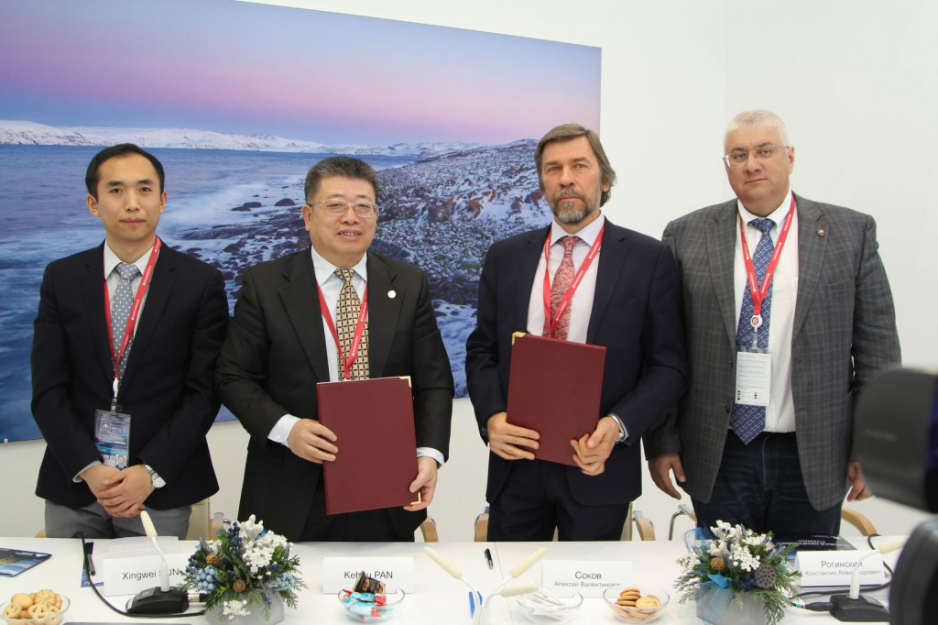Russian and Chinese Scientists to Establish Arctic Research Center

Representatives of the Institute of Oceanology at the Russian Academy of Sciences and Qingdao National Laboratory for Marine Science and Technology meet to establish a joint research center (Press Release: PP Shirshov Institute of Oceanology of the Russian Academy of Sciences (RAS)).
Russian and Chinese representatives of two major oceanological institutes signed an agreement to create a joint Arctic research center for studying mineral and biological resources and the changing ecosystem.
“The center will bring Russian-Chinese scientific cooperation to a new level,” says Alexei Sokov, Director of the Institute of Oceanology at the Russian Academy of Sciences.
“The results [of our study of climate change and the Arctic] will be useful not only for Russia and China, but also for the entire world community,” says Secretary General of the Qingdao National Laboratory for Marine Science and Technology, Professor Kehou Pan.
Plans to study the Arctic
On April 10, Director Alexei Sokov and Secretary General Kehou Pan agreed to establish the Chinese-Russian Arctic Research Center to conduct joint research projects in the Far North. The agreement, signed at the fifth International Arctic Forum in St. Petersburg, is set to provide the basis for numerous joint Arctic expeditions and research projects between the two scientists’ organizations.
The joint research center will lead projects to better understand the climate, geology and ecology of the region and preserve the region’s natural diversity. Sokov stressed that intensive development of the Arctic shelf threatens the regional ecosystem. Consequently, the center’s work will be dictated by the need to preserve the unique underwater ecosystems. Pan highlighted the need to study the effect of the Arctic on global climate change.
It was also declared that the center’s research will make it possible to forecast the ice conditions of the Northern Sea Route and provide environmentally conscious recommendations for Arctic economic development. This will be achieved by taking field surveys of the region aboard the Institute of Oceanology’s research vessels. These projects are set to involve leading experts of the largest Chinese and Russian research organizations.
Emphasis on ecosystems
At the recent St. Petersburg forum, a Chinese politician, Arken Imirbaki, took the opportunity to speak on China’s role in Arctic affairs. “Though China is not an Arctic power, it is still one of the countries that is close to the High North and the changes that take place in the Arctic affect the climate, the ecosystems, the forestry, the fishing industry of China,” said Imirbaki, the Vice Chairman of the National People’s Congress Standing Committee.
The ecosystem focus of the newly announced research center is noteworthy since previous Sino-Russian Arctic research collaborations have mostly been focused on industrial development. For example, in 2016, the Far Eastern Federal University in Russia and the Harbin Polytechnic University in China established the Russian-Chinese Polar Engineering and Research Center.
“Joint research between Russia and China will help both sides since basic research and data collection on the Arctic on the Russian side is from the Soviet era,” Dr Xiaochen Chen, Director of International Studies at Renmin University in China told HNN.
In contrast to the more recently announced center, the 2016 joint research team dedicated its study to developing engineering capabilities, such as ice-resistant platforms and more durable icebreakers. The team also proclaims to perform work in the interest of Russian energy company Rosneft to assess the geocryological conditions of the Arctic.
China’s stance on Arctic research
The signing of this more recent Chinese-Russian research center agreement is the latest example of China’s plans to deepen its understanding of the Arctic. It shows that scientific research on climate change and its consequences is a key driver of China’s Arctic policy.
In 2018, China published its first official Arctic Policy. The white paper declared China’s freedom to conduct scientific research, and emphasized China’s commitment to protecting the region’s fragile biodiversity and addressing climate change.
In practice, China has been engaged in Arctic research for some time. In 2003, the Polar Research Institute of China established the Arctic Yellow River Station on Svalbard, where other Arctic states also have their own research stations. China has also dispatched an icebreaking research vessel Xuelong (Snow Dragon) to the Arctic seas. A second icebreaker, Xuelong 2, is set to commence Arctic expeditions in 2019.
Latest example of Sino-Russian cooperation
The agreement is also a sign that China realizes they cannot develop and explore the Arctic alone. China is already active in the International Arctic Science Committee and is a permanent observer at the Arctic Council. The establishing of a Chinese-Russian research center demonstrates China’s desire to further cooperate with circumpolar states, particularly Russia.
“Russia is open to cooperate (to a certain extent) with China in the Arctic because collaboration brings the possibility of access to capital and developing technology for the development of resource extraction,” says Professor Frédéric Lasserre from the Université Laval Québec.
Dmitry Tulupov, Senior Lecturer at St. Petersburg State University, says “the implementation of scientific research projects between Russian and Chinese partners will be limited only to those areas, which do not significantly impact the Russian military.” Tulupov told HNN that “military cooperation with China in the Arctic is not considered a relevant option by Moscow so far.”
Russia is interested in attracting China as a major partner in Arctic affairs because their participation will help expand scientific research and help Russia’s understanding of the resource potential of the Russian Exclusive Economic Zone (EEZ).
Accordingly, “Russia has become the greatest supporter for China’s ambitions,” says Professor Glenn Diesen of the Higher School of Economics in Moscow. China, “seeking to tie the Eurasian continent together with Chinese technologies and strategic industries,” is establishing itself as a key Arctic actor and seems to depend on Russia to realize their ambitions.

